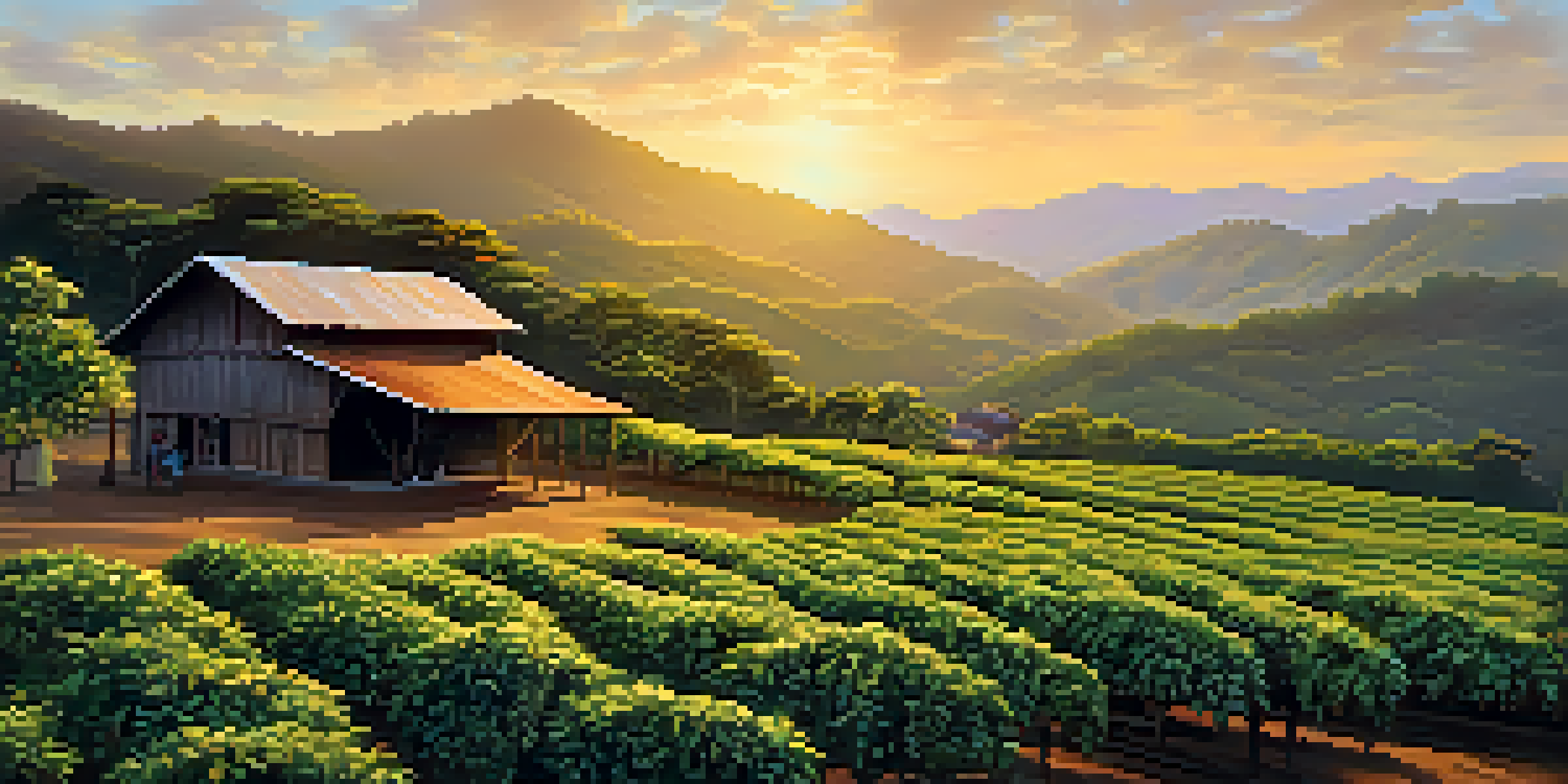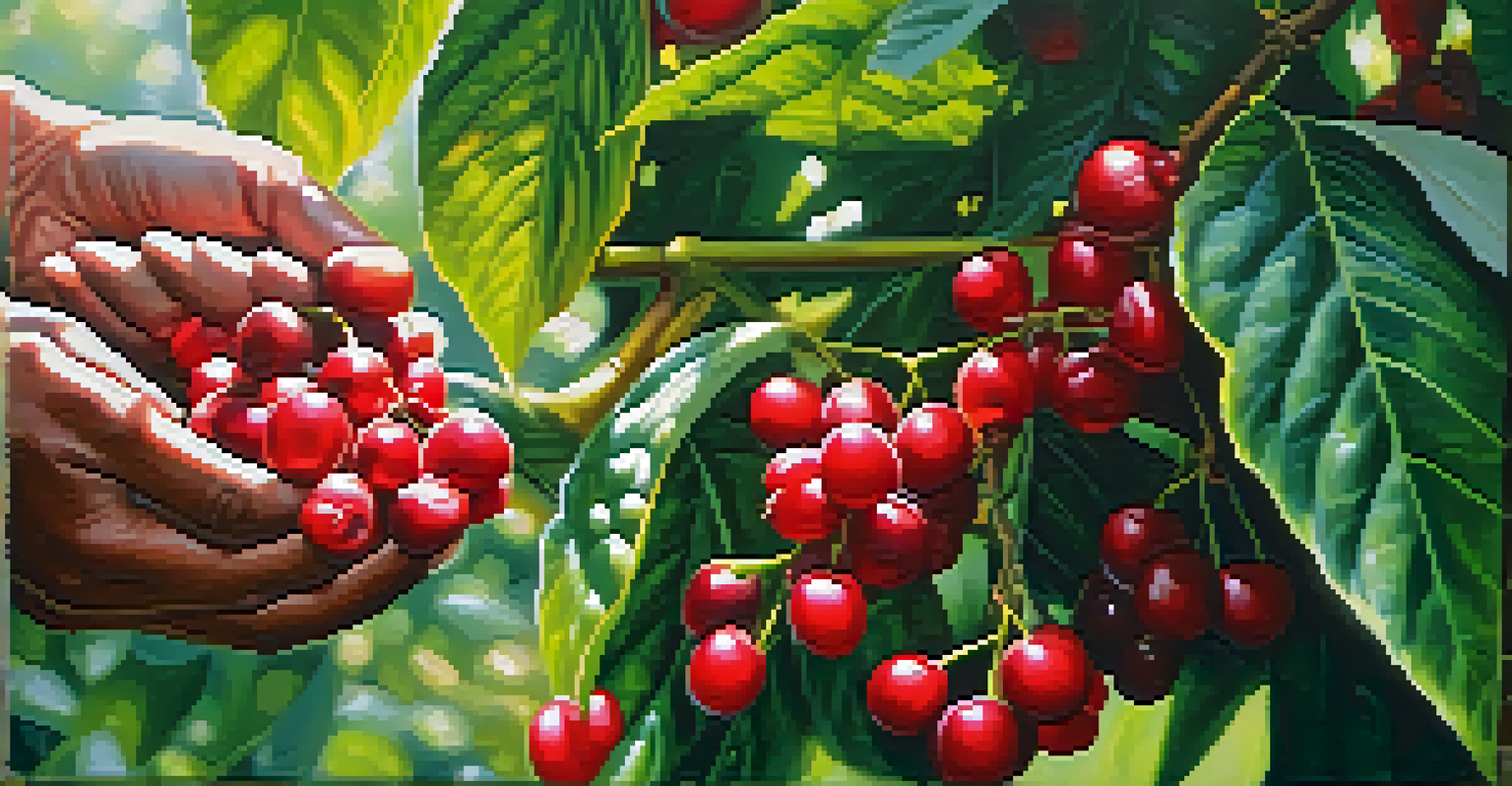Coffee Tastings in Brazil: A Flavorful Cultural Experience

The Rich History of Coffee in Brazil
Brazil has a storied history with coffee, being the largest producer in the world. The journey of coffee in the country began in the 18th century when it was introduced from French Guiana. Over the years, Brazil's diverse landscapes and climate have made it ideal for growing various coffee beans, leading to a rich agricultural tradition.
Coffee is a language in itself.
Coffee cultivation has shaped Brazilian society, influencing everything from economics to culture. It has spurred the development of entire regions, like Minas Gerais, where coffee plantations are a common sight. The legacy of coffee is not just in its production; it’s woven into the fabric of Brazilian life.
Today, tasting coffee in Brazil is more than just sipping a cup. It’s an invitation to experience a part of the nation’s identity, showcasing the unique flavors and aromas that reflect the land and its history. This cultural experience draws visitors from around the globe.
Understanding Brazilian Coffee Varieties
Brazil is home to a plethora of coffee varieties, each with unique flavors and characteristics. The most common types are Arabica and Robusta, with Arabica being the preferred choice for its smoother taste. However, within these categories, there are numerous sub-varieties that offer distinct profiles.

For instance, the Bourbon variety is known for its sweet, chocolatey notes, while the Catuai brings a vibrant acidity to the cup. Tasting different varieties during a coffee tasting allows enthusiasts to appreciate the nuances and complexities of Brazilian coffee. It’s like discovering a new layer to a familiar song.
Brazil's Coffee Heritage
Brazil's rich history with coffee has shaped its culture and economy, making it a vital part of national identity.
When you participate in a coffee tasting in Brazil, you're not just sampling drinks; you're embarking on a flavorful journey through the country's diverse climates and traditions. Each sip tells a story about the land it comes from, making the experience both educational and enjoyable.
The Art of Coffee Tasting
Coffee tasting, or 'cupping,' is a meticulous process that allows participants to evaluate the flavors, aromas, and textures of coffee. This practice involves smelling the coffee grounds, slurping the brew, and then identifying various tasting notes. It’s a sensory experience that engages the palate and the nose.
The most delicious coffee is the one we share with friends.
During a coffee tasting in Brazil, experts guide participants through the cupping process, offering insights into what makes each coffee unique. They may point out hints of fruit, chocolate, or even floral notes that can emerge from different beans. This guided experience transforms a simple coffee break into an educational adventure.
Engaging in this ritual not only enhances appreciation for coffee but also connects tasters with the farmers and regions that produced the beans. It creates a deeper understanding of the journey from plant to cup, making each tasting a celebration of craftsmanship and culture.
The Role of Coffee Farms in Brazil
Visiting coffee farms is an essential part of the tasting experience in Brazil. Many farms offer tours that allow visitors to see the coffee-growing process firsthand, from planting to harvesting. These immersive experiences help people appreciate the hard work and dedication that go into producing high-quality coffee.
On these farms, you can often participate in picking coffee cherries, which gives you a real sense of the labor involved. It's a great way to connect with the land and understand the importance of sustainable practices in coffee production. Plus, you get to enjoy freshly brewed coffee right from the source!
Diverse Coffee Varieties
The country boasts an array of coffee varieties, each offering unique flavors that reflect Brazil's diverse climates.
The interaction with local farmers during these visits enhances the cultural experience, as they share stories about their traditions and practices. This connection not only enriches your knowledge but also fosters a sense of community and appreciation for the craft of coffee making.
Cultural Significance of Coffee in Brazilian Society
Coffee in Brazil isn't just a beverage; it's a cultural symbol that represents hospitality and connection. Sharing a cup of coffee is a common social practice, bringing friends and family together. It reflects the warmth and friendliness that Brazilian culture is known for.
In many Brazilian homes, coffee is served throughout the day, often accompanied by sweet treats. This ritual emphasizes the importance of taking a break and enjoying the moment, whether it's a quick coffee at work or an afternoon gathering with loved ones. It shows how deeply embedded coffee is in the daily lives of the Brazilian people.
During coffee tastings, this cultural aspect is celebrated, as participants engage in conversations and share their experiences. It creates a communal atmosphere that highlights the joy of coffee, making each tasting session a memorable social event.
Finding the Best Coffee Tasting Experiences in Brazil
When it comes to experiencing coffee tastings in Brazil, there are numerous options to choose from. Many cities, especially in coffee-growing regions like Minas Gerais and São Paulo, host tasting events and workshops. These experiences are often led by passionate baristas or coffee connoisseurs who are eager to share their knowledge.
Additionally, some specialty coffee shops offer tasting flights featuring various Brazilian coffees, allowing you to sample different flavors side by side. This format gives you a chance to compare and contrast, making it easier to find your personal favorite. It's like a mini tour of Brazil’s coffee landscape in a single sitting.
Sustainability in Coffee Production
Brazilian coffee farms are increasingly adopting sustainable practices, ensuring environmental responsibility while enhancing coffee quality.
For those looking to dive deeper, consider joining a coffee tour that includes visits to multiple farms and tastings. Not only will you taste incredible coffee, but you'll also gain insights into the entire brewing process, making it an unforgettable experience.
Sustainability Practices in Brazilian Coffee Production
Sustainability is a growing concern in coffee production, and Brazil is taking steps to ensure its coffee industry remains environmentally friendly. Many coffee farms are adopting practices that minimize environmental impact, such as organic farming and agroforestry. These methods not only protect the land but also enhance the quality of the coffee beans.
During coffee tastings, you'll often hear about these sustainable practices from the farmers themselves. They may explain how shade-grown coffee fosters biodiversity and improves soil health. This commitment to sustainability enriches the tasting experience, as each cup of coffee reflects a responsible approach to agriculture.

By choosing to support sustainable coffee, consumers can make a positive impact, ensuring that future generations can enjoy the rich flavors of Brazilian coffee. This connection between sustainability and flavor makes every sip not just satisfying but also meaningful.